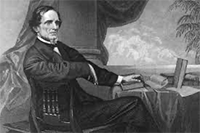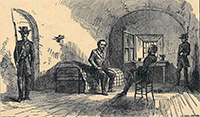Jefferson Davis: Soldier, Statesman, Confederate President
The Confederate Congress chose Davis as President of the Confederacy. Davis, who had hoped for a military command, reluctantly accepted. He proved authoritative and argumentative, disagreeing with his generals on war strategy and feuding with state governors on whose generosity he depended for a continued supply of manpower and supplies. He also had an extremely difficult time securing funding to finance the war effort. 
The primary mission for the Confederate government, it seemed, was to prosecute the war. The central government found it increasingly difficult to finance the war effort, with either men or money. The various states had control of their militias and lent them to the central war effort with varying degrees of regularity. Confederate soldiers originally signed on for a 12-month term. A great many of those were killed in action or on the march or in a military hospital or in any number of accidents. However, a great many also served out their one-year terms and had no desire whatever to return to the fighting. The Confederate congress was forced to enact the first conscription law in the history of the American continent. Enacted on April 16, 1862, this law required men ages 18–35 to serve for three years. Not enough men in that age range were available, and so the congress, just seven months later, raised the upper age limit to 45. A final change to the age of conscription came on Feb. 17, 1864, when the age range became 17–50. Finances were a problem as well. For a start, Article I, Section 9.9 of the constitution stipulated an exact plan for the what and the why: "All bills appropriating money shall specify in Federal currency the exact amount of each appropriation and the purposes for which it is made." Early on, the Confederate congress instituted a tax on all property that included slaves. The states found this money through borrowing rather than by collecting it from their citizens. This gave property owners more money to spend on their possessions and upkeep but created large amounts of debt that the states struggled to repay and the central government was forbidden from relieving. In 1863, the Confederate congress widened the net, introducing a direct income tax and a tax on agricultural products, including livestock. By this time, the farmers who bore the burden of such a tax were struggling and found it expedient–and, in many cases, rather easy–to avoid paying. One of the titanic struggles of Davis and his government was to get Britain, France, and other nations to recognize the Confederacy as a sovereign nation and treat it as such. Convinced in part by intense lobbying by U.S. representatives and in perhaps larger part by the Union naval blockade of Southern ports, those European nations never agreed to such recognition; coincidentally, they had large stores of cotton already when the war started and so didn't need to keep buying right away, when the Confederacy needed money to finance the buying of ammunition and artillery and the paying of soldiers; as the war dragged on, the onetime buyers of Southern cotton found it expedient to continue the trend of not buying and, more importantly, not granting loans that the Confederate government so desperately needed. 
Another headache for Jefferson Davis and his government was that in February 1863, many in the South were giving serious consideration to seceding from the Confederacy. Tired of taxes and other impositions, they wanted out, to run their own state, to do their own thing. As the war dragged on and the Union armies occupied more and more Southern territory, the number of proposed amendments to the constitution grew. In the end, the North won the war, with more men and more weapons and more money and industry and, in some cases, luck. Union armies occupied the main Southern centers, alternating between taking over and destroying, depending on the circumstances. The Confederate government, already hamstrung by its constitutional restrictions, proved unable to provide for a war that was increasingly going the way of the Union. Staring down the barrel of defeat, many in the Confederate congress entertained the idea of a negotiated peace. Indeed, President Abraham Lincoln and Secretary of State William Seward took part in a peace conference with Vice-president Alexander Stephens and other Confederacy representatives at Hampton Roads, Va., on Feb. 3, 1865. The two sides couldn't agree, and the Confederacy limped on. 
Robert E. Lee surrendered to Ulysses S. Grant at Appomattox on April 9, 1865. Davis and the rest of the Confederate government had evacuated Richmond the week before. The surrender of Joseph Johnston's Army of Tennessee on April 26 ended the fighting. Davis and his family traveled in Europe for awhile and then returned to the U.S., living in Tennessee and then settling in Mississippi, on an estate near Biloxi. He never requested an official pardon from the U.S. Government and so was ineligible to serve again in the U.S. Senate. He had a brief stint with a Memphis insurance company, which went under financially. He spent his later years writing The Rise and Fall of the Confederate Government, which came out in 1881. He died in New Orleans on Dec. 6, 1889. First page > Background and Leadup to War > Page 1, 2 |
|
Social Studies for Kids
copyright 2002–2025
David White



 Davis, on the run, ran out of options and was captured in Georgia on May 10. He served time in prison at Fort Monroe, Va., and was released on bond in May 1867. (He was indicted for treason but didn't face trial.)
Davis, on the run, ran out of options and was captured in Georgia on May 10. He served time in prison at Fort Monroe, Va., and was released on bond in May 1867. (He was indicted for treason but didn't face trial.)
